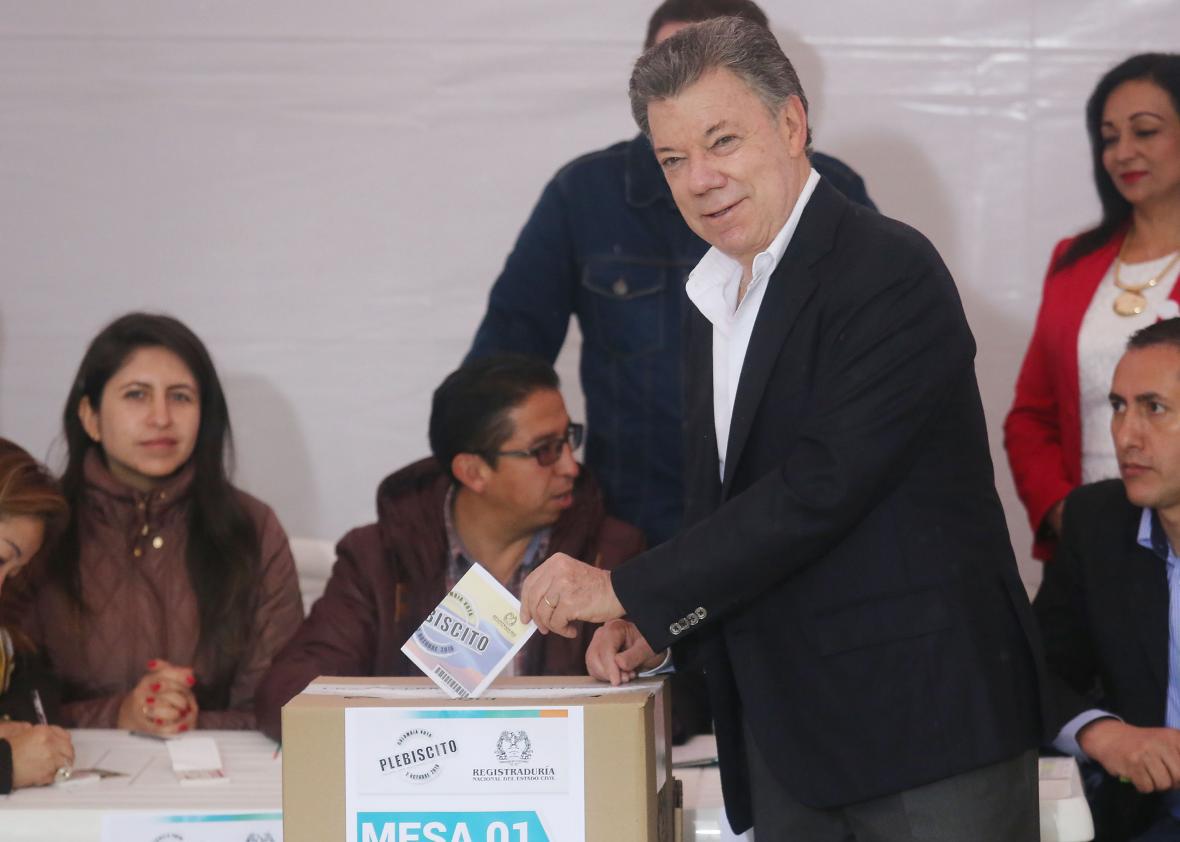Colombian voters shocked the world over the weekend by rejecting a landmark peace deal between their government and the FARC guerrillas, which would have formally ended a 52-year civil war that has killed more than 220,000 people.
There may be some scrambling on Monday in Oslo, as Colombia President Juan Manuel Santos and FARC commander Rodrigo Londono (aka Timochenko) had been considered front-runners for the Nobel Peace Prize that is scheduled to be announced later this week. Now it seems like the four years they spent negotiating the agreement may have been for naught, and no one is quite sure what comes next.
The good news is that despite Santos’ warnings in the lead-up to the vote that a rejection of the agreement would mean a “return to armed conflict,” we’re unlikely to see an immediate resumption of widespread violence: Both sides say a cease-fire that began in June will remain in place and that they will return to the negotiating table. But with the campaign for the 2018 presidential elections set to begin in just a few months, it seems unlikely that Santos will be able to wrangle a new agreement in the time he has left before the country’s election season derails the opportunity to work out a new deal.
Until Sunday, Santos’ insistence, over the FARC’s objections, that the deal be contingent on voter approval had seemed like a risky but shrewd move by the president: During negotiations, the FARC knew that any concessions they demanded from the government had to be palatable to the public as well. Santos was confident, too confident as turned out, that Colombians would still be willing to make some painful sacrifices in return for peace.
One of the more controversial provisions of the deal would have allowed the FARC to compete as a political party in the 2018 presidential and legislative elections, and would have reserved 10 seats for them in Congress through 2026. Another would have allowed many FARC fighters to avoid jail time if they participated in a truth-and-reconciliation process. Opponents of the agreement, led by former president and Santos’ onetime political mentor Alvaro Uribe, have argued that the FARC’s leaders belonged in jail rather than Congress.
But in the end, it seems like the agreement was done in less by voter anger than by apathy. The deal’s supporters felt far less enthusiasm for the deal than its opponents did against it. The “No” camp won by a razor-thin margin—50.2 percent to 49.8 percent—with a turnout of less than 38 percent. As the Washington Post’s Nick Miroff points out, the months of fanfare—from the Pope Francis–blessed framework agreement last fall, to June’s cease-fire, to last week’s high-profile signing ceremony attended by John Kerry, Raúl Castro, and Ban Ki-moon—didn’t help to rally public opinion. The agreement was also thought of by many as a fait accompli, and many of the “yes” voters likely didn’t come out, assuming that the vote was a formality.
As with June’s Brexit referendum—to which many are comparing this shocking popular vote—the Colombian plebiscite was a case in which one side’s argument was based on making a safe bet (avoiding the risk of returning to civil war/avoiding the potential damage to the British economy) and the other side’s case was based on principle (punishing the FARC for its crimes/standing up for national sovereignty).
In both cases, supporters of the government’s position were far less enthusiastic than those who wanted to send an angry message to their leaders. It’s something that apathetic supporters of the establishment in other countries—this one, say—ought to keep in mind on Election Day.
